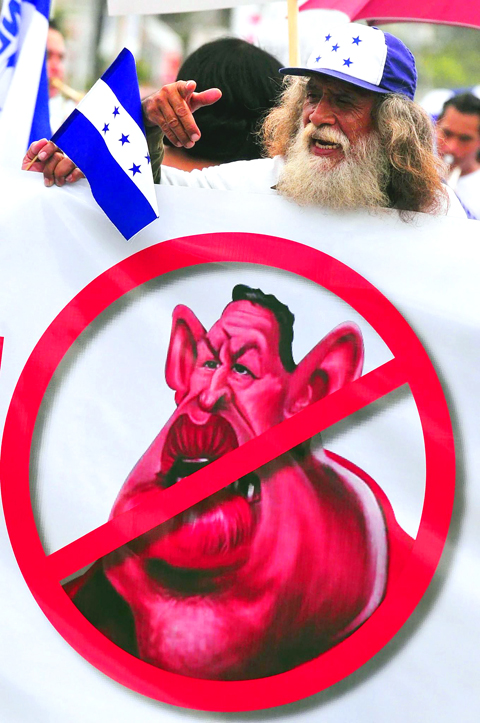Opponents of Venezuelan President Hugo Chavez held protests on Friday against the leftist leader in cities across Latin America, in an effort coordinated through Twitter, Facebook and a Web site titled “No More Chavez!”
They grasped banners and signs with images of Chavez in a straitjacket and wearing a red clown nose.
“Chavez, the shame of Bolivia,” read a banner in La Paz.

PHOTO: EPA
Police in Colombia estimated more than 5,000 marched in Bogota waving flags. Thousands also took to the streets in the capitals of Venezuela and Honduras. Some said they were protesting what they called Chavez’s growing authoritarianism, while others said he should stop meddling in other countries’ affairs.
Interim Honduran President Roberto Micheletti defended the June coup that deposed Chavez ally Manuel Zelaya while addressing protesters in Tegucigalpa.
“Any politician who tries to stay in power by hitching up with a dictator like Hugo Chavez, he won’t achieve it,” Micheletti said.
“We’ll stop him,” he said.
Chavez — who was traveling in Syria — ridiculed the protests on Thursday, likening Micheletti to a gorilla and saying: “Those who want to march, march with ‘gorill-etti,’ the dictators, the extreme right.”
Chavez supporters held smaller counter-demonstrations in Caracas, where about 100 people gathered, and elsewhere.
Turnout for the global anti-Chavez protest was far from massive in many cities. Crowds ranging from a dozen to 200 people gathered in New York, Sao Paulo, Madrid, Panama City and the capitals of Argentina and Ecuador.
Protest organizer Marcela Garzon in Colombia said there were no figures available on how many people participated globally, and that more important than the number was the opportunity to “express ourselves.”

In the sweltering streets of Jakarta, buskers carry towering, hollow puppets and pass around a bucket for donations. Now, they fear becoming outlaws. City authorities said they would crack down on use of the sacred ondel-ondel puppets, which can stand as tall as a truck, and they are drafting legislation to remove what they view as a street nuisance. Performances featuring the puppets — originally used by Jakarta’s Betawi people to ward off evil spirits — would be allowed only at set events. The ban could leave many ondel-ondel buskers in Jakarta jobless. “I am confused and anxious. I fear getting raided or even

Kemal Ozdemir looked up at the bare peaks of Mount Cilo in Turkey’s Kurdish majority southeast. “There were glaciers 10 years ago,” he recalled under a cloudless sky. A mountain guide for 15 years, Ozdemir then turned toward the torrent carrying dozens of blocks of ice below a slope covered with grass and rocks — a sign of glacier loss being exacerbated by global warming. “You can see that there are quite a few pieces of glacier in the water right now ... the reason why the waterfalls flow lushly actually shows us how fast the ice is melting,” he said.

Eleven people, including a former minister, were arrested in Serbia on Friday over a train station disaster in which 16 people died. The concrete canopy of the newly renovated station in the northern city of Novi Sad collapsed on Nov. 1, 2024 in a disaster widely blamed on corruption and poor oversight. It sparked a wave of student-led protests and led to the resignation of then-Serbian prime minister Milos Vucevic and the fall of his government. The public prosecutor’s office in Novi Sad opened an investigation into the accident and deaths. In February, the public prosecutor’s office for organized crime opened another probe into

RISING RACISM: A Japanese group called on China to assure safety in the country, while the Chinese embassy in Tokyo urged action against a ‘surge in xenophobia’ A Japanese woman living in China was attacked and injured by a man in a subway station in Suzhou, China, Japanese media said, hours after two Chinese men were seriously injured in violence in Tokyo. The attacks on Thursday raised concern about xenophobic sentiment in China and Japan that have been blamed for assaults in both countries. It was the third attack involving Japanese living in China since last year. In the two previous cases in China, Chinese authorities have insisted they were isolated incidents. Japanese broadcaster NHK did not identify the woman injured in Suzhou by name, but, citing the Japanese